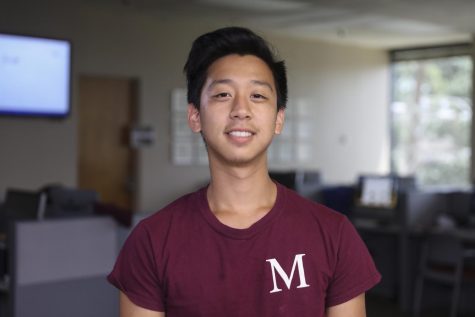JC’s Declassified School Survival Guide: Being Asian in College
November 23, 2019
In a university full of SoundCloud rappers, eccentric professors and school budget cuts, JC Canicosa— that’s me—and the Wolf try to do the impossible: create a guide that will help you survive Loyola.
*cue theme song*
Kamusta Wolf Pack. Also xi chao, Kon’nichiwa and nǐ hǎoi.
If you could not already tell, this edition of JC’s Declassified is all about the Asian experience in college and what that entails. But, the thing about the Asian experience is that it’s so multifaceted and different for everyone. There are literally BILLIONS of us, so for me to go out and give you four to five different tips about being Asian in college from my personal, subjective experience could not possibly give the experience justice.
So with that in mind, every tip has come from a different subjective viewpoint of a different Asian American perspective at Loyola. Here are what some of the best minds had to say:
1. Just because you’re not in a STEM (Science, Technology, Engineering and Math) field, doesn’t mean you’re unsuccessful. Don’t be afraid to be successful doing something you love. The reason why there’s lack of Asian representation in a lot of industries is because we let those expectations be boundaries. These high expectations set for us at an early age should be a guideline for the even higher expectations that we set for ourselves — to do what we’re passionate about and do what we love.
-Amy Ngo, journalism senior
2. Depending on who you ask, we may or may not be considered people of color. Know that we are, and that our communities have experienced our share of oppression and marginalization in this country that most people just don’t know about because it’s barely taught or talked about. Even on college campuses today, the Model Minority Myth and Perpetual Foreigner Myth (Google them if you don’t know what they are) are alive and kicking in most of our lived experiences, so don’t be afraid to challenge microaggressions and correct misconceptions whenever you’re faced with them. And if you don’t know how, use your resources — whether that be the Loyola Asian Student Organization (LASO), Office of Diversity & Inclusion (ODI) and/or other faculty and staff of color at Loyola — to help you navigate your belonging at this institution.
-Will Hsu, Community Director for Department of Residential Life
3. Take advantage of the Satchmo’s commuter lounge as a place to recharge and don’t be ashamed to bring your “stinky” food! In fact, consider bringing some to share! We can always feel self-conscious at first about the flavors and smells of our cultural heritage, and often times other people might be genuinely curious about our food but not know how to ask about it. But once we get past the initial discomfort of being part of a new experience, we help expand each other’s “normal” as a community. Furthermore, our pride for our heritage is infectious — we can’t expect other people to welcome us or take pride us being a part of the community if we aren’t proud of our roots first.
-Gabby Lenz, Office Manager for Department of Residential Life
4. From my short time here at Loyola, I’ve realized that the best thing you can do is be yourself. The people here are very open and won’t criticize you because of your ethnicity or how you look. Embrace your heritage and love who you are. If you do this, your college experience will be great.
-London Hua, advertising freshman
5. I would say there’s a tendency to hang around other Asians as a source of comfort. Just don’t forget that you are an individual with distinct goals and aspirations separate from those in the group. Explore other groups and be friends with other types of people. You learn and achieve more when you leave that source of comfort.
-Mindy Ngo, Loyola alumnus Class of ’17
6. Coming from a high school that was mostly Asian in demographic, going to college in New Orleans was definitely a culturally shocking change. It felt like people saw me differently, and it made me feel pretty insecure in the beginning. So for me, it was a matter of changing my perspective. I knew what I liked and I knew what I was good at. I knew who I was, and I knew what I had to keep working on and improve. And in doing that, I realized that no one can define my racial identity but me. I know what being a Filipino American means to me, and I’m proud of it every day.
-JC Canicosa, journalism senior








